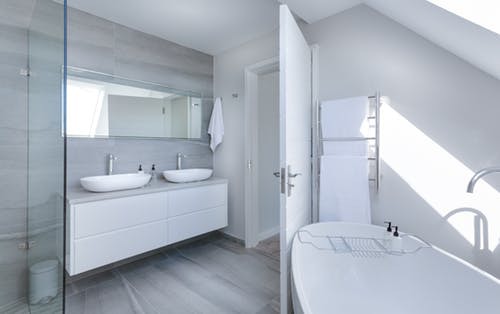Picture this: you walk into your office first thing in the morning, and everything is in its place, the air smells fresh, and the surfaces are sparkling clean. There’s an undeniable energy that a clean environment can infuse into a workplace. But beyond just the aesthetics, have you ever considered how efficient cleaning could elevate productivity in the office? Let’s explore this idea further.
1. Reduced Sick Days
Regular and thorough cleaning, especially in office and meeting rooms, helps minimize the spread of germs and bacteria in the office, reducing the risk of illness among employees. By maintaining a clean and hygienic workspace, employees are less likely to get sick, resulting in fewer sick days taken. A healthier workforce means more consistent attendance and higher productivity levels.
2. Improved Indoor Air Quality
Proper cleaning practices, including dusting, vacuuming, and air purification, contribute to better indoor air quality. Removing dust, allergens, and pollutants from the air creates a healthier and more comfortable work environment for employees. Improved air quality can reduce respiratory issues, allergies, and other health problems that may affect productivity.
3. Enhanced Mental Clarity and Focus
A clean and clutter-free workspace promotes mental clarity, focus, and concentration among employees. When desks, workstations, and common areas are organized and tidy, employees can find what they need more easily and are less distracted by clutter. Clearing physical clutter also helps clear mental clutter, allowing employees to focus more effectively on their tasks and projects.
4. Boosted Employee Morale and Satisfaction
A clean and well-maintained office environment contributes to employee morale and satisfaction. Employees feel valued and respected when their workplace is clean, comfortable, and conducive to productivity. A positive work environment fosters a sense of pride and ownership among employees, leading to higher levels of engagement, motivation, and job satisfaction.
In healthcare and dental office settings, cleanliness is paramount not just for productivity but also for patient safety. That’s where specialized services offered by trusted companies like Sunset Quality Cleaning can make a significant difference. These services understand the specific needs and standards required to ensure a hygienic environment and can provide cleaning regimens that support both health professionals and patient care.
5. Increased Efficiency and Workflow
Efficient cleaning practices help streamline operations and improve workflow efficiency in the office. When cleaning tasks are performed promptly and thoroughly, employees can move freely throughout the workspace without disruptions or obstacles. Clean and well-organized workspaces also facilitate collaboration, communication, and teamwork among employees, leading to smoother workflow processes and project execution.
6. Professional Image and Client Impressions
A clean and well-maintained office space reflects positively on the company’s image and professionalism. When clients or visitors enter a clean and tidy office environment, they are more likely to perceive the company as organized, efficient, and trustworthy. A professional image enhances the company’s reputation and instills confidence in clients, which can lead to increased business opportunities and success.
7. Reduction in Workplace Stress
A cluttered or dirty work environment can contribute to feelings of stress and overwhelm among employees. By maintaining a clean and organized workspace, employers create a more supportive and conducive environment for employee well-being. Reduced stress levels lead to higher morale, better mental health, and improved overall job satisfaction, all of which contribute to increased productivity in the office.
8. Fostered a Sense of Responsibility and Ownership
Implementing efficient cleaning practices fosters a sense of responsibility and ownership among employees regarding the cleanliness and maintenance of their workspace. When employees actively participate in keeping their work areas clean and organized, they develop a greater appreciation for the workspace and take pride in its upkeep. This sense of ownership encourages employees to be more conscientious about cleanliness, leading to a more collaborative and proactive approach to maintaining a productive work environment.
Efficient Cleaning Techniques
Not all cleaning routines are created equal. The most productive office environments benefit from professional and efficient cleaning practices. This includes:
-
Regular Deep Cleaning Schedules: Establishing regular deep cleaning schedules ensures that all areas of the office receive thorough cleaning and maintenance on a consistent basis. Deep cleaning goes beyond routine surface cleaning and addresses areas that may be overlooked during daily maintenance, such as behind furniture, inside cabinets, and in high-traffic areas.
-
Use of High-Quality, Effective Cleaning Products: Investing in high-quality cleaning products that are effective against a wide range of germs and pathogens is crucial for achieving optimal cleanliness in the office.
-
Proper Training for Cleaning Personnel: Providing proper training for cleaning personnel ensures that they have the knowledge and skills to perform their duties effectively and efficiently. Training should cover proper cleaning techniques, safety protocols, use of cleaning equipment and products, and adherence to cleaning schedules.
-
Implementing a Cleaning Checklist: Implementing a cleaning checklist helps ensure accountability and thoroughness in the cleaning process. A comprehensive checklist outlines specific cleaning tasks to be completed in each area of the office, including daily, weekly, and monthly tasks.
-
Adapting Cleaning Schedules to Specific Needs: Recognizing that different areas of the office have unique cleaning needs allows for more targeted and efficient cleaning practices. For example, high-traffic areas may require more frequent cleaning to remove dirt and debris, while less frequently used areas may only need periodic maintenance.
Implementing these efficient cleaning techniques ensures that your office is not just superficially clean but hygienically maintained as well.
Final Thoughts
The link between a clean office and high productivity is stronger than one might initially think. Cleanliness is a key factor that supports organization, health, morale, and a positive image – all of which are fundamental to a productive work environment. Investing in regular and efficient cleaning is not just about making the office look good; it’s about making your team feel good and work better.

